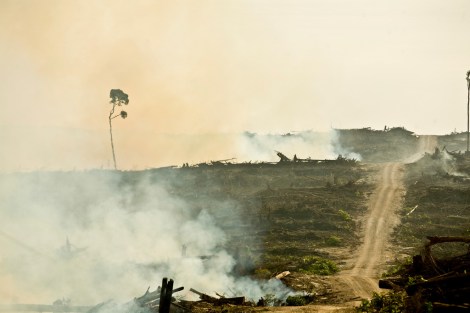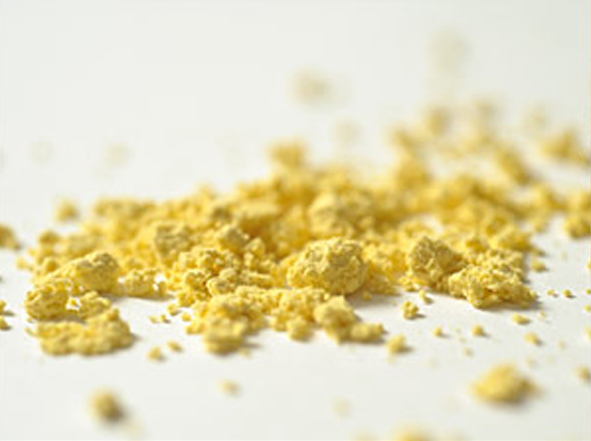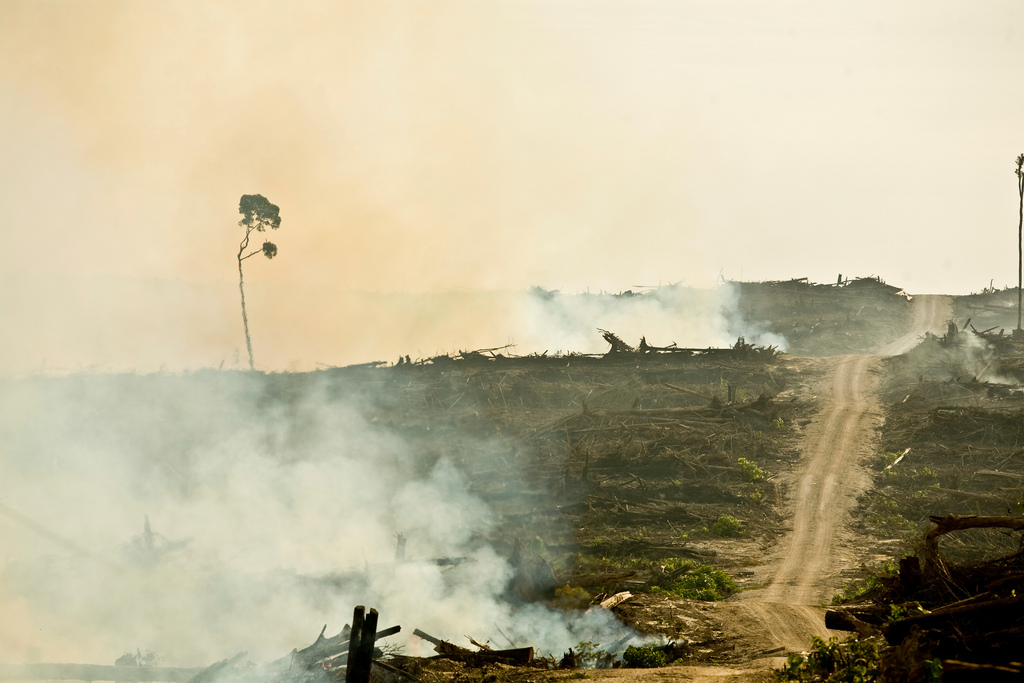Palm oil has stirred concern among treehuggers and animal lovers for years now. Following its explosion in popularity as a trans-fat-free alternative, we started finding out about the dark side of its production — namely, the destruction of Southeast Asian rainforest, habitat to lovable orangutans. Ecological outrage conflicted with our fondness for favorite snack foods, like Girl Scout cookies, challenging our morals as conscious consumers.

David Gilbert/Rainforest Action NetworkOpen burning in newly cleared rainforest at Duta Palma’s PT Ledo Lestari palm oil plantation.
But while the environmental sins of the palm oil industry have been well documented, its human-rights abuses have been overlooked — until now. Bloomberg Businessweek reports on the findings of a nine-month investigation:
Among the estimated 3.7 million workers in the industry are thousands of child laborers and workers who face dangerous and abusive conditions. Debt bondage is common, and traffickers who prey on victims face few, if any, sanctions from business or government officials.
Bloomberg relates the story of one 19-year-old Indonesian called “Adam” (a pseudonym) and his cousin, who left their rural island home with the foreman of a palm oil plantation who promised to pay them $6 a day (approximately the minimum wage in Borneo, where they were headed) to drive trucks. Along the way, he coerced them into signing a contract that obliged them to do any kind of work their boss asked for only $5 a day — but only after two years’ unpaid work, during which they were “loaned” $16 a month for basic necessities. Workers at the plantation, owned by major palm oil supplier Kuala Lumpur Kepong, told of not being allowed to leave without permission, and of a policy that no “reason/excuse whatsoever” would be accepted for a worker to go home during the first two years. They had essentially become slaves, trapped in miserable conditions 2,000 miles from home:
At PT 198, a plantation near Berau owned by top KLK shareholder Batu Kawan, workers entered a system of tightly controlled forced labor, according to Adam and other alleged victims. At least 95 workers were held at the plantation for up to two years. At night they were locked in stifling, windowless barracks. An environmental NGO, Menapak, later reported that they were fed small portions of salted fish and rice, which several said were often weevil-infested. A truck with fresh water came once a month, but that supply would last no more than a week; workers pulled most water for cooking, cleaning, and drinking from a stagnant ditch that ran alongside the barracks. Adam says [their boss] confiscated their national identity cards and school certificates, along with a deed to a home, which his village collectively owned.
Instead of working as drivers or low-level administrators, the workers were ordered to prepare the newly planted palm groves. Some had to spread at least 20 50-kilogram sacks of fertilizer each day. If they fell short, they had to make it up the next day or see their already deferred pay cut. They say they were required to spray with the herbicide Paraquat, a substance that’s been linked to kidney and liver damage and is banned in at least 32 countries. (China, which announced in April it would phase out the herbicide, would be the 33rd.) Because they weren’t given protective gear, some claim to have suffered respiratory damage. An alleged victim, “Jacob,” who was held with his wife for two years at PT 198, reported nightly bloody coughing fits but says [the foreman] denied him adequate medical care.
Adam and his cousin eventually escaped (with the help of a coal-company truck, incidentally). A supervisor at the plantation later alerted authorities to the conditions there, and a few months later, after intervention from NGO Menapak, a palm-oil watchdog group, and a national labor union, followed by reporting by Rainforest Action Network, KLK officials apologized to workers and promised to pay for their passages home and return their stolen pay. Adam says he received neither, and it appears that the officials responsible for abuses at PT 198 may still be working for KLK.
KLK palm oil and its derivatives have been sold, through Cargill, to Nestle, General Mills, Kraft, and Kellogg. Derivatives of KLK palm oil also appear in Procter & Gamble’s Crest toothpaste, Gillette shaving cream, and Olay skin-care products. KLK is a member of the Roundtable on Sustainable Palm Oil, which claims a commitment to bettering the industry. But critics question the depth of RSPO’s investment in sustainability. Only 35 percent of member growers have been certified as sustainable — a process involving third-party evaluation — and no member has ever been penalized for labor violations, despite the fact that, according to Tomasz Johnson of London’s Environmental Investigation Agency, “Every time an NGO shines a light into the activities of an RSPO producer, it finds dirt.”
According to Bloomberg, when told about these alleged human rights violations, Kellogg, Kraft, General Mills, and Procter & Gamble all simply referred to their supplier codes of conduct, which supposedly forbid such abuses. Nestle promised to investigate further. Cargill, the largest privately held company in the U.S., brushed off the allegations, saying it had concluded that KLK was in the clear.
Though the U.S. and some European countries have started to exert pressure on the industry, their impact is outweighed by consumers in China and India, which import more than a third of the world’s palm oil. As long as these countries’ middle classes, with their appetite for cooking oil, keep growing, palm oil will have a booming market, and the industry may see little reason to change its practices: A 2009 Ruder Finn Asia study found that only 5 percent of Chinese consumers consider labor conditions when they make purchases. That study also reported, however, that 44 percent of Chinese would pay more for more environmentally friendly products (compared to less than 40 percent of Brits and Americans).
Does orangutan well-being present a more powerful impetus for change than human rights? Perhaps combined consumer outrage at both, plus a helping of corporate guilt, will finally be enough to get the industry to clean up its act.



